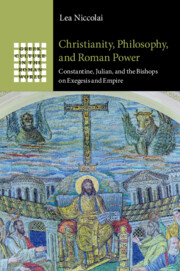 Christianity, Philosophy, and Roman Power
Christianity, Philosophy, and Roman Power from Part III - After Julian: Philosophy in the World
Published online by Cambridge University Press: 07 July 2023
The first section addresses the debate between Julian’s supporters and detractors following his sudden death in 363. Christian preachers turned Julian’s propagandistic use of his life into proof that Roman history was regulated by Christian providence. However, they also had to confront Julian’s re-assessment of the power dynamics between the ruler and the priests in the post-Constantinian empire. I argue that Julian was wary of how the identification of religious allegiance as the criterion for determining whether an emperor was a philosopher-ruler affected the interaction between the emperor, now decentred from his religious structures of choice, and the ecclesiastical leaders. The second section shows that that the episcopal engagement with philosophical ideas both provided clerics with a weapon against Julian’s attempts to re-centre the ruler in religious matters and shaped the relationship between the bishops and emperors in addressing heresy - a key challenge faced by Christianity in its self-construction as perfect system of knowledge. Episcopal appeals to an exclusive control of knowledge also affected the public role of non-conforming philosophers, which I illustrate with a case study of Synesius of Cyrene.
To save this book to your Kindle, first ensure [email protected] is added to your Approved Personal Document E-mail List under your Personal Document Settings on the Manage Your Content and Devices page of your Amazon account. Then enter the ‘name’ part of your Kindle email address below. Find out more about saving to your Kindle.
Note you can select to save to either the @free.kindle.com or @kindle.com variations. ‘@free.kindle.com’ emails are free but can only be saved to your device when it is connected to wi-fi. ‘@kindle.com’ emails can be delivered even when you are not connected to wi-fi, but note that service fees apply.
Find out more about the Kindle Personal Document Service.
To save content items to your account, please confirm that you agree to abide by our usage policies. If this is the first time you use this feature, you will be asked to authorise Cambridge Core to connect with your account. Find out more about saving content to Dropbox.
To save content items to your account, please confirm that you agree to abide by our usage policies. If this is the first time you use this feature, you will be asked to authorise Cambridge Core to connect with your account. Find out more about saving content to Google Drive.